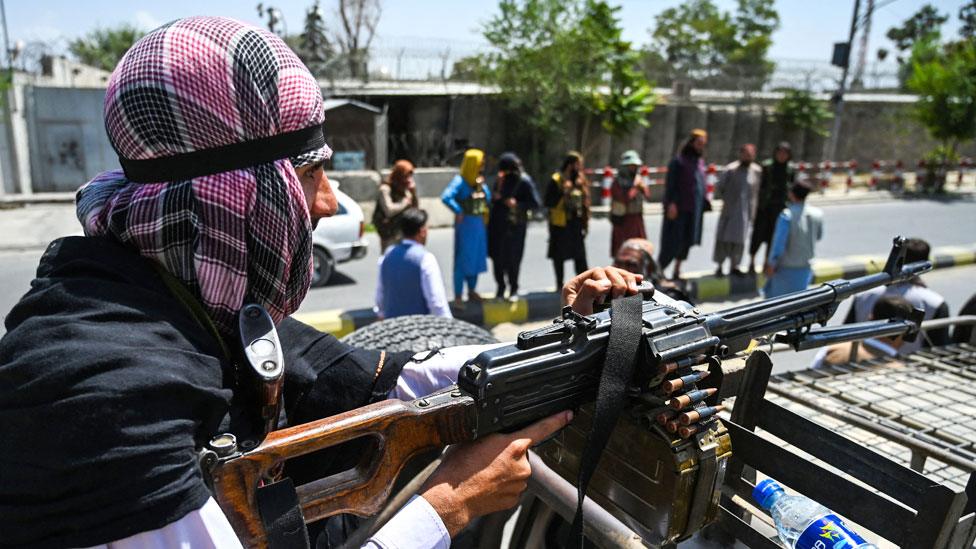Afghanistan: NI soldier Capt Mark Hale died in vain, says wife
- Published
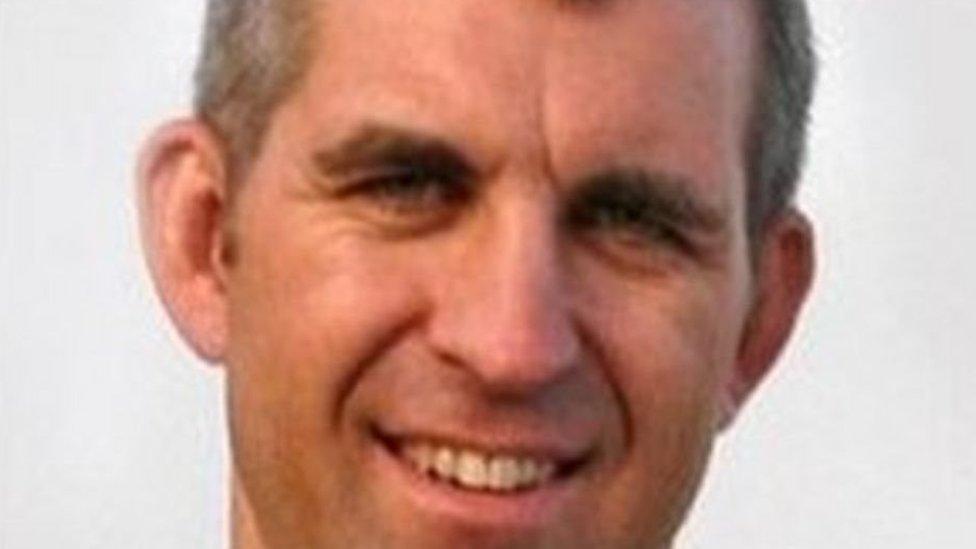
Captain Mark Hale was fatally wounded in a bomb attack in Afghanistan
The widow of a soldier from County Down who was killed in Afghanistan has said her husband "died in vain".
Almost 20 years after they were ousted from power, the Taliban has effectively seized control of the country.
It follows the withdrawal of most foreign troops in recent days.
Brenda Hale, whose husband Capt Mark Hale was killed in August 2009, external, said by withdrawing from the country, Western governments have left people "in the mouth of hell".
Afghanistan's capital city, Kabul, was the last major territory to fall to the Taliban, with the collapse of the country's government.
President Ashraf Ghani has also fled abroad.
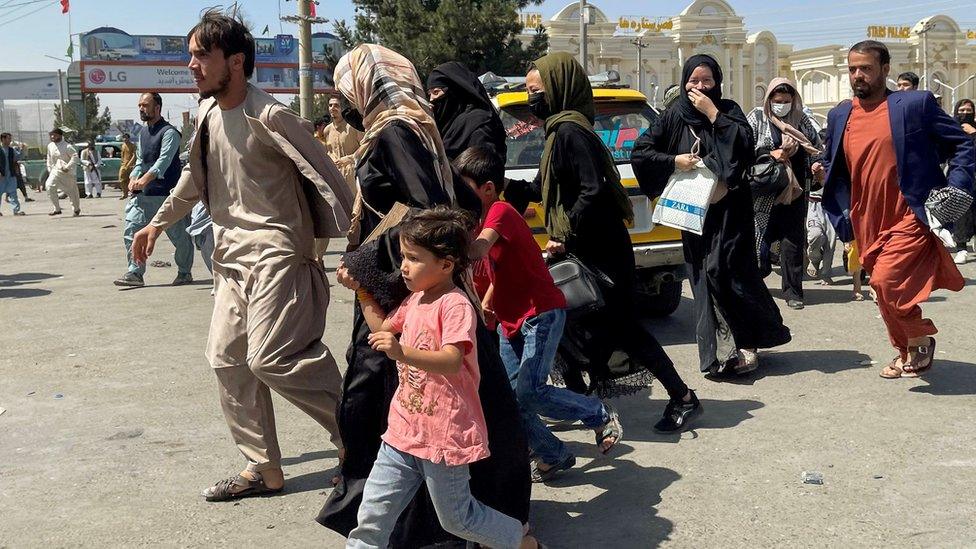
People try to get inside Hamid Karzai International Airport in Kabul
On Monday, crowds descended on Kabul's international airport, which is under the control of US troops, in an attempt to leave Afghanistan.
Mrs Hale, a former DUP assembly member, said the events in Afghanistan coincided with the 12th anniversary of her husband's death and she watched the television pictures with a "knot" in her stomach and "in a state of anxiety".
Speaking to BBC News NI, Mrs Hale said the television pictures from Afghanistan are "difficult to watch" and the situation across the country is "hard to comprehend".
Mrs Hale claimed that Western governments have abandoned the Afghani people and left the country "like a concentration camp and given the Nazis the key".
She said her husband was a "hugely compassionate and kind man" and, whilst in Afghanistan, had worked hard to protect local residents from the Taliban.
She insisted that Capt Hale and his military colleagues really believed they were "trying to build some sort of democracy in Afghanistan to help that country move forward".
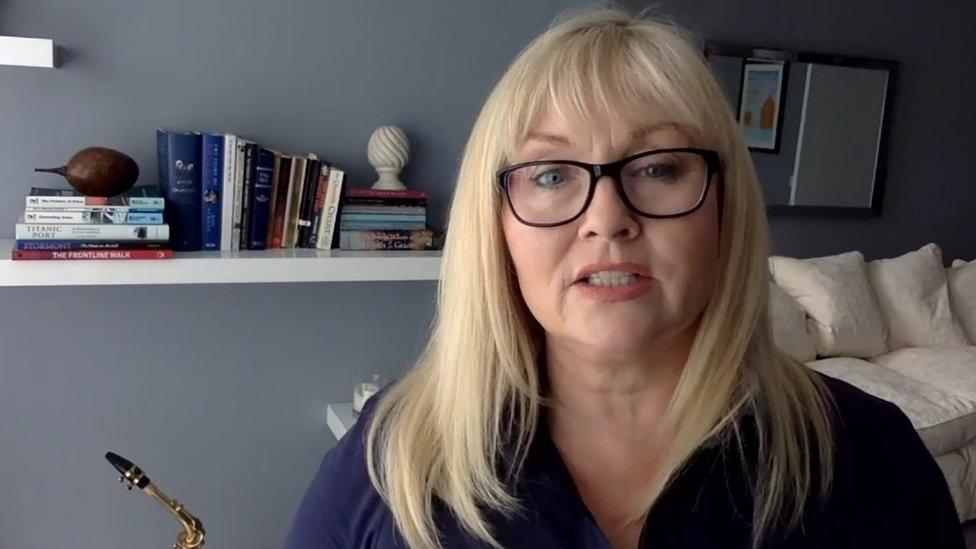
Brenda Hale, whose husband Capt Mark Hale was killed in August 2009, said the situation is "hard to comprehend"
Mrs Hale added that after the Western Forces left the country, "we have sent the devil in after them and that petrifies me for the people living in Afghanistan".
She said that by leaving the country, the West was creating "a dystopian playground for international terrorists to train and come and hit the West at any given time".
The former politician also said having to negotiate with the Taliban would be "a very bitter pill to swallow".
UK government 'dropped the ball'
MPs are to debate the Taliban takeover of Afghanistan on Wednesday in the House of Commons.
Alliance deputy leader Stephen Farry thinks the debate has come "a little late in this process".
The North Down MP said the government has "dropped the ball on this" and should have acted sooner.
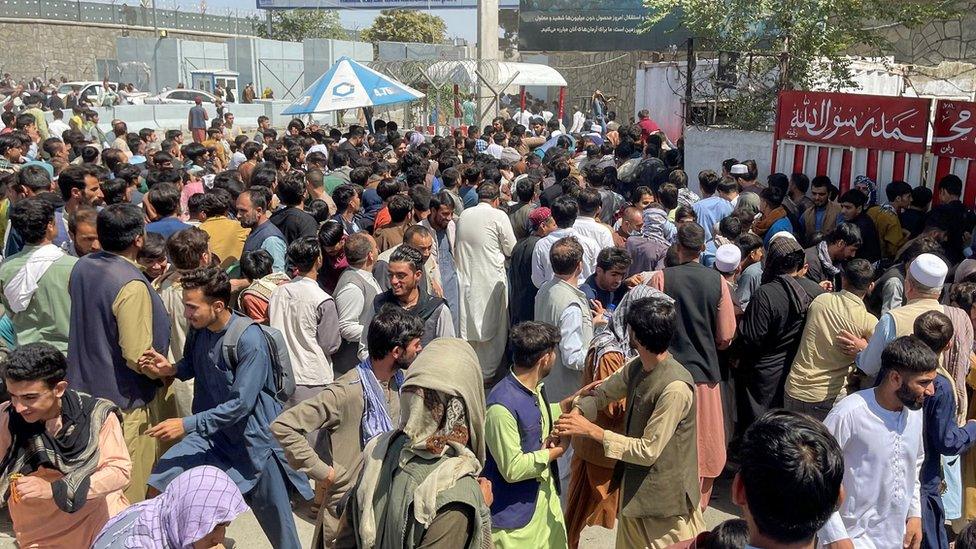
Crowds outside Kabul's international airport
DUP leader Sir Jeffrey Donaldson said Northern Ireland has a duty to consider offering sanctuary to some refugees from Afghanistan.
He said people who worked with British forces and in particular Christian minority groups should be offered support.
Sir Jeffrey, who visited troops from Northern Ireland in the country a number of times, said it was evident the coalition-backed police and army "weren't up to the task of taking on a much smaller, less well-equipped Taliban".
He told BBC News NI's Good Morning Ulster he feared there would be "terrible consequences from the Taliban" for those citizens who "very courageously worked alongside our military".
SDLP MP Claire Hanna told BBC News NI that Northern Ireland has "a capacity to take a number of refugees and asylum seekers".
She said they will be people who make "a strong contribution to life here".
Irish citizens
Ireland's Foreign Minister Simon Coveney has said 15 Irish citizens are currently looking to leave Afghanistan.
Mr Coveney confirmed there were a total of 23 Irish citizens currently in Afghanistan, adding he was "very concerned" about the situation there.
"Some have expressed a preference to stay for now, because they are working with humanitarian organisations and doing very important work that is becoming even more important now," he told RTÉ's Morning Ireland.
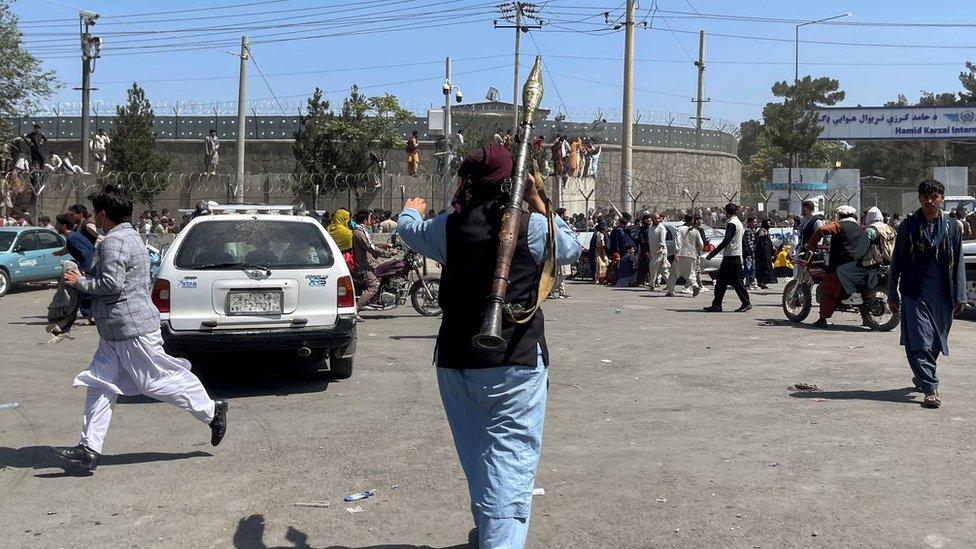
A Taliban member outside the airport
Mr Coveney also said the Irish government had already made decisions about visa waivers for Afghan people.
"We've already approved 45 visa waivers - some of those people are trying to get out and some are in Pakistan having fled across the border and are flying into Ireland," he said.
"I have agreed we would certainly make available between 100 and 150 more places in terms of refugees, and we will be prioritising human rights organisations, media, women and girls, and other family members that are vulnerable."
An Irish woman currently in Kabul says she is hoping to be able to return home within the next 48 hours.
Aoife MacManus, from Ashbourne in County Meath, has been living in Kabul for two years, working in the primary education sector.
She said "there is a sense of panic and fear all over the city - it's the fear of the worst expectations".
She said that leaving her work compound on Sunday "everybody was crying because of the expectations of what things are going to be like".
"All the work we've put into education, that it might all be for nothing."
'Hung out to dry'
Ulster Unionist Party leader Doug Beattie, who served three tours in Afghanistan with the Royal Irish Regiment, said he had "a real sense of anger, a real sense of sadness, but most of all a real sense of fear" about what has happened.
"Fear for the people of Afghanistan, especially women and young girls who will now be airbrushed out of that society and repressed once again," he continued.
Mr Beattie, who reached the rank of captain, said he believed there would be reprisals for Afghan citizens who worked with and worked for the coalition forces.
The Upper Bann assembly member said many women and young girls could face "virtual enslavement" with the potential for the "horrific" treatment of people in villages and rural areas under a Taliban regime.
Sinn Féin Deputy First Minister Michelle O'Neill said the international community needed to act to help the people of Afghanistan.
She added: "Previously the Stormont Executive welcomed Syrian refugees as part of the British government relocation and resettlement scheme.
"Our party would certainly support such a scheme for Afghans to provide whatever measure of support we can."
- Published17 August 2021
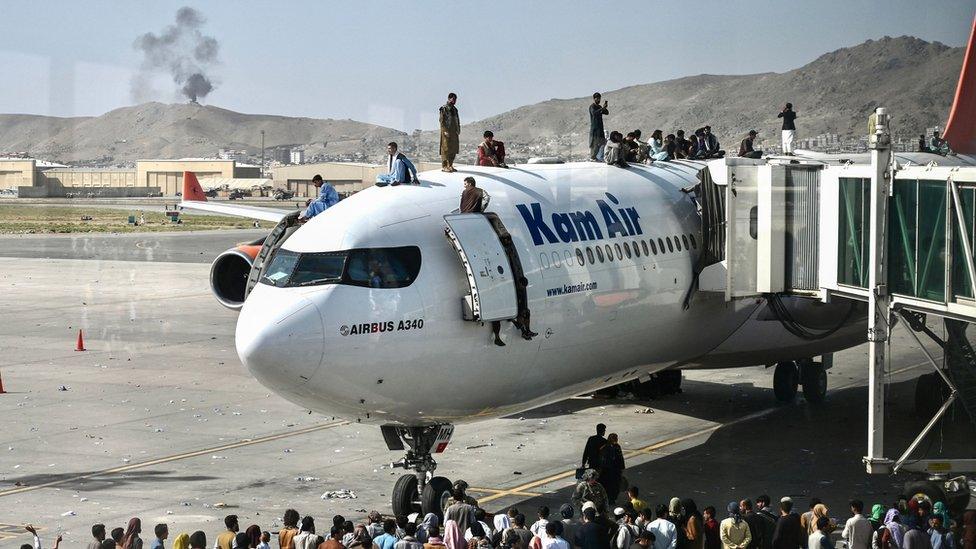
- Published15 August 2021
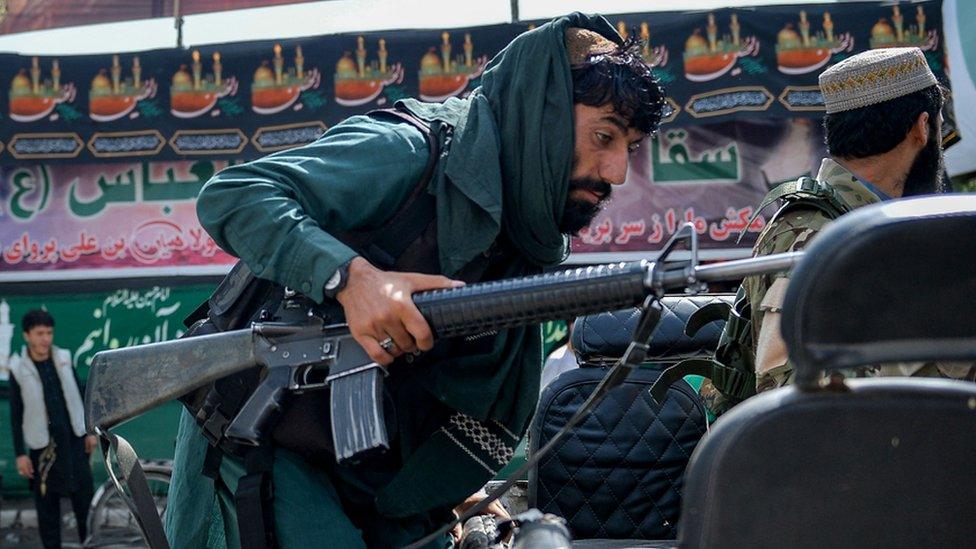
- Published16 August 2021
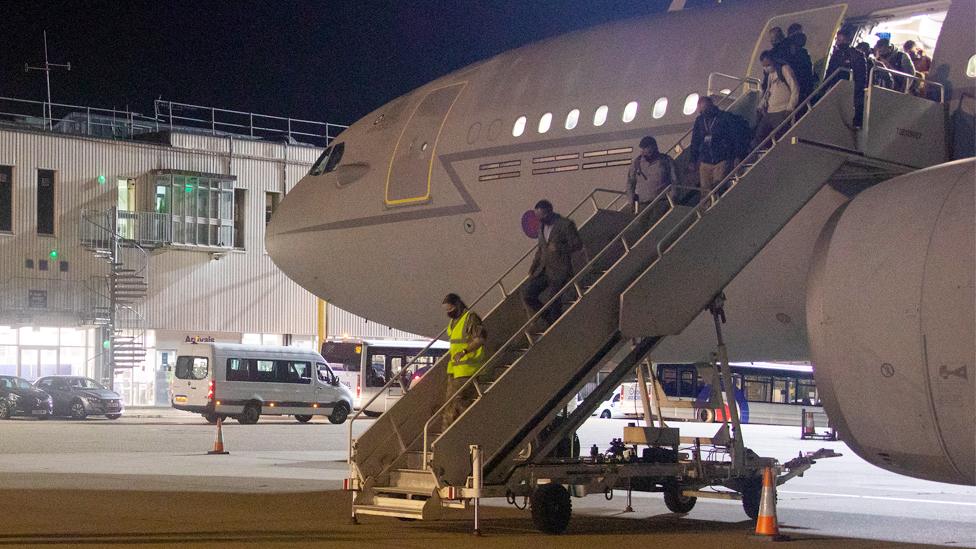
- Published15 August 2021
